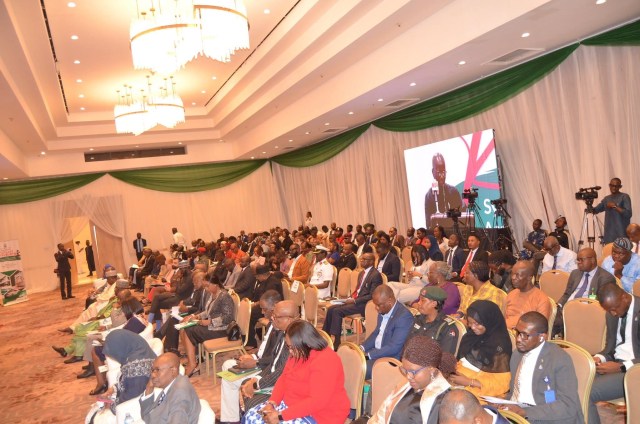
President Tinubu Reaffirms Commitment to Transparency, Accountability in Management of Recovered Assets
ABUJA, NIGERIA – May 27, 2025… President Bola Ahmed Tinubu has reaffirmed his administration’s commitment to transparency and accountability in the management of recovered assets.
President Tinubu made this known at a National Asset recovery summit organised by the Federal Ministry of Justice (FMOJ) in partnership with Anti-corruption Agencies and supported by the Africa Network for Environment and Economic Justice (ANEEJ) yesterday in Abuja.
Represented by the Permanent Secretary for Political and Economic Affairs in the Office of the Secretary to the Government of the Federation, Engr. Nadungu Ggare, President Tinubu, said his administration’s “resolve as a government to fight corruption is unwavering and unshakable.”

While officially unveiling the National Central Database of Recovered Assets, Gbare described it as a bold and strategic step towards transparency, accountability, and justice, emphasising that the new database and related reforms will foster trust and enhance the efficiency of asset recovery and management.
Themed “Synergising Towards an Effective Asset Recovery and Management,” the summit drew high-level participation and consensus on the need for systemic reforms in the asset recovery landscape.
The Attorney-General of the Federation and Minister of Justice, Prince Lateef O. Fagbemi, SAN, in his opening address reiterated the government’s firm commitment to transparency and accountability in asset recovery. “Asset recovery is a fundamental pillar in our strategy to address corruption, economic crimes, and illicit financial flows, which undermine our national development,” he said. “The Federal Government has remained resolute in its pursuit of transparency, accountability, and adherence to the rule of law in the management of recovered assets. This is because we recognise that the effective recovery and management of assets are crucial to restoring public trust and fostering sustainable economic growth.”
On the National Central Database itself, Fagbemi said: “The National Central Database of Forfeited Assets, alongside the Proceeds of Crime (Standardised Automated Asset Forfeiture Management System) Regulations 2024, was developed to enhance transparency and accountability. Relevant organisations are required to populate the database monthly with records of forfeited assets under their purview. I commend all Relevant organisations for their cooperation and support, which has led us this far.”
In her welcome remarks, the Solicitor General and Permanent Secretary of the Federal Ministry of Justice, Mrs. Beatrice Jedy-Agba, stressed the transformative potential of asset recovery as a bridge between justice and development. She called for robust public reporting mechanisms and institutionalised accountability to safeguard recovered funds from mismanagement.

Speaking on behalf of the High Commissioner, British High Commission, UK, Dr. Matthew Ayibakuro, Governance and Policy Adviser highlighted the longstanding partnership between the UK and Nigeria in fighting financial crime.“The UK has a long history of collaborating with stakeholders in Nigeria in the global effort against financial crime. Together, we have made significant strides since the return of democracy in 1999 to build more effective law enforcement agencies that are better able to detect, investigate and prosecute anti-corruption and economic crime,” Ayibakuro said.
On asset recovery, Ayibakuro emphasised its central role in the broader fight against corruption. “Asset recovery is a central pillar in these efforts. Confiscating and recovering the proceeds of crime are essential to leveraging sanctions against offenders and securing justice for victims.” Evidence has shown that putting stolen assets towards the delivery of public goods and services is the best way of ensuring anti-corruption efforts deliver for ordinary citizens.
He also referenced a key milestone in accountability efforts: “Also, last month, we had the official launch of an assessment of Nigeria’s commitment to the Global Forum on Asset Recovery (GFAR) principles, conducted by our partner, the Africa Network for Environment and Economic Justice (ANEEJ). The findings in the report highlight Nigeria’s growing dedication to transparency and accountability in managing repatriated funds.”
“We hope these efforts, alongside the reforms to Nigeria’s asset recovery regime being announced today, will mark a mutually beneficial deepening of our engagement on asset recovery,” the UK rep said.
Rev. David Ugolor, Executive Director of ANEEJ, commended the Federal Ministry of Justice and FCDO for convening the summit and launching the National Central Database as a bold stride towards transparency and efficiency. He underscored the vital role of civil society in ensuring recovered assets benefit vulnerable communities, stressing the need for synergy among government, international partners, and citizens.

“We commend the Federal Government for key reforms being launched today, particularly the National Central Database of Recovered Assets and the Standardised Automated Asset Forfeiture Management System Regulations, 2024. These are bold steps toward a more open and efficient asset recovery process,” Ugolor said.
“We firmly believe that recovered assets must not only be returned, but must also be used effectively to benefit the Nigerian people, especially the poor and marginalised,” he added.
Other summit participants, including representatives from the United States Embassy, the National Drug Law Enforcement Agency (NDLEA), Nigerian Financial Intelligence Unit (NFIU), and international bodies such as the United Nations Office on Drugs and Crime (UNODC), echoed their support for the database as a critical tool to enhance transparency, accountability, and international collaboration.
The National Central Database of Recovered Assets, developed under the Proceeds of Crime (Recovery and Management) Act, 2022 regulation, will centralise and track recovered and forfeited assets, providing stakeholders with accessible and reliable information. This initiative complements the recently enacted Proceeds of Crime (Standardised Automated Asset Forfeiture Management System) Regulations, 2024, which together represent a technology-driven framework to combat corruption and asset mismanagement.
As Nigeria continues to grapple with the complex challenges of asset recovery, participants at the summit collectively agreed that the launch of the National Central Database marks a pivotal shift toward systemic transparency and public accountability. The platform is expected to significantly enhance public trust, improve coordination among agencies, and deter future illicit financial flows.
For further information, please contact 09069725955 or info@aneej.org and follow us on twitter, Instagram and facebook: @aneejnigria, @Latakpu, aneej__nigeria and facebook.com/aneejnigeria